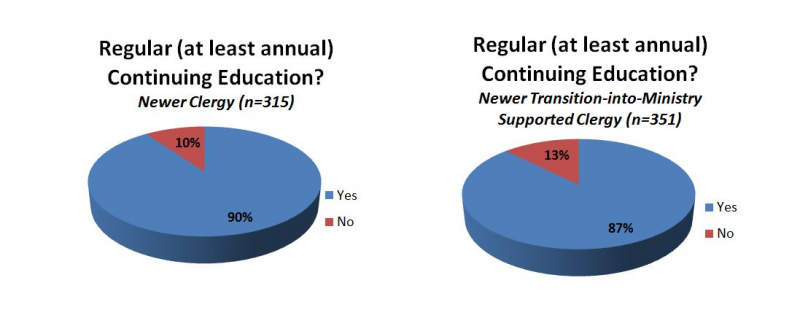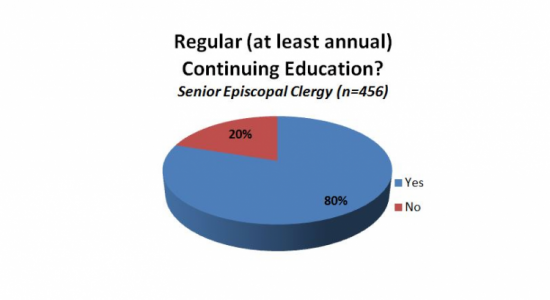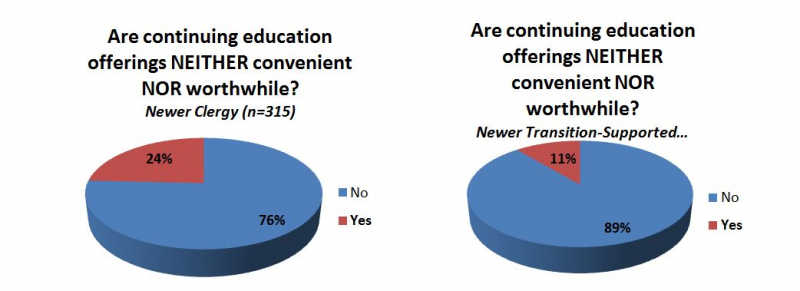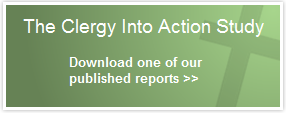Choosing to invest in continuous learning and capacity development is clearly connected with effectiveness in ministry and leadership.
It is heartening to note that between 87% and 90% of newer pastors and priests regularly take advantage of continuing education opportunities—at least once a year.
These clergy participated in continuing education to strengthen their learning and capacities in a variety of areas:
- Preaching
- Pastoral care
- Congregational leadership
- Spiritual direction
- Youth ministry
- Marriage and family
- Organizational management and development
- Personal and professional wellness
- Biblical and theological courses
Some listed programs likely required by their denominations—such as anti-racism training and prevention of sexual misconduct. Others listed more intensive programs like additional graduate degree or certificate programs.
This is encouraging, compared to a previous study of more senior Episcopal priests in solo or senior positions of congregational leadership – only 80% of senior clergy said they participated at least annually in continuing education. The focus on continuing development may wane over the years as one acquires skills or simply settles into ways of doing things. It is also possible that seminaries and post-seminary development programs have helped foster a new generation of clergy more committed to continuous development.
But this is not the whole picture. Not all who participate in continuing education do so willingly. We asked clergy, “In your opinion, are continuing education offerings generally NEITHER convenient NOR worthwhile?” Nearly one-fourth (24%) of newer priests and pastors who went right from seminary into ministry without a clearly identified transition and early development program agreed. In contrast, only 11% of newer clergy who participated in Transition into Ministry (TiM) programs agreed—and only 14% of senior Episcopal priests agreed.
This pattern suggests a higher degree of dissatisfaction with and disengagement from continuing education among those newer pastors and priests who have not benefited from focused support and development programs during their early years of ordained ministry.
Regular participation in continuing education is a clear signal that a pastor or priest is personally invested in growth and development. Those who regularly take advantage of continuing education opportunities also show other indications of strong leadership—while those who do not pursue continuing education or who regard it as not worth their time also show indications of weaker leadership.
In the previous study of 456 senior priests in the Episcopal Church, Dreibelbis and Gortner (2002) found that continuing education was a basic marker of clergy effectiveness.1
“Those [priests] who participated regularly in continuing education also reported more mentors shaping their ministries, had more training in decision-making, were more likely to have ordained and lay confidants, and networked more extensively in their communities and dioceses. They preferred an innovative approach to work, were more self-directed and less directed by circumstance in their work… and were less likely to conform to ecclesial structures and regulations… They were less likely to describe themselves as calm and cautious, but more likely to describe themselves as self-confident and demonstrative. In situations of conflict, they were more likely to choose assertive strategies; and in decision-making, they were less likely to pursue low-pressure (i.e., people-pleasing) strategies. They were more likely to engage in spiritual practices of self-care, and they engaged in more regular prayer, reflection, study, and public expression of their faith.
We are finding some of the same patterns in the Clergy Into Action Study—as future reports will reveal.
Related Article
1 John Dreibelbis and David Gortner, Talented but Tenuous: A Profile of Clergy Temperaments and Leadership Skills, research report submitted to the Lilly Endowment (Evanston, IL: Seabury-Western Theological Seminary, 2002,) p. 92.





